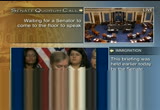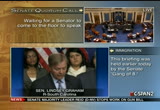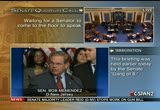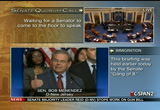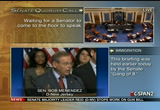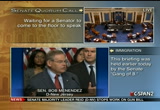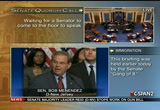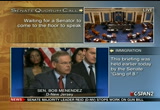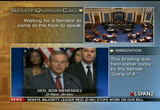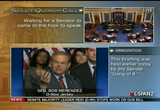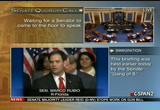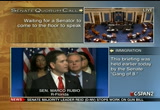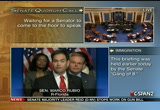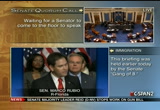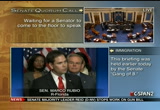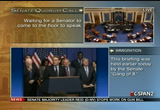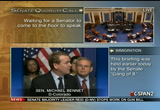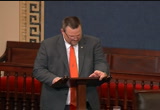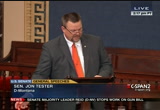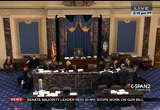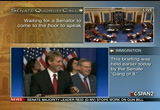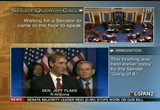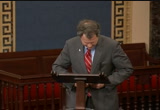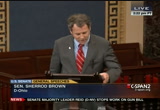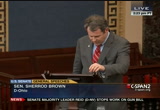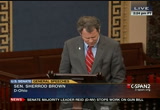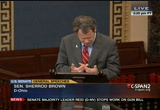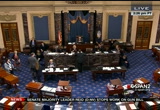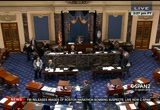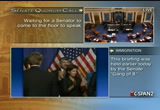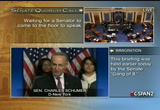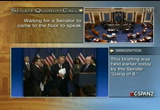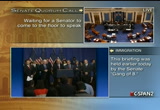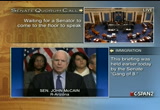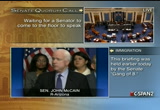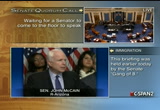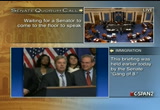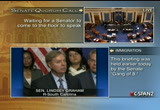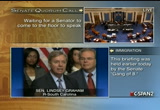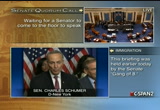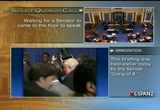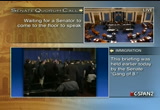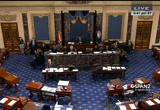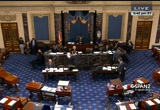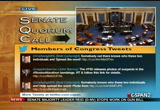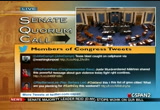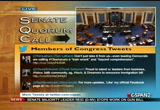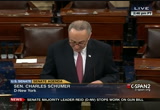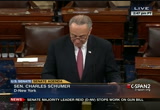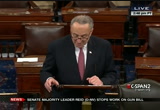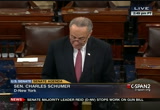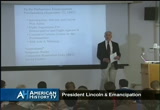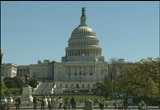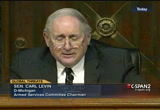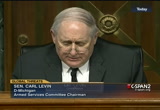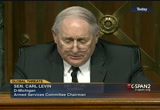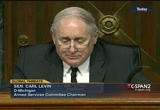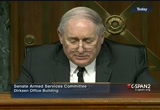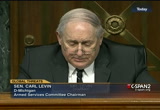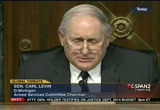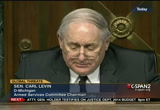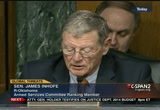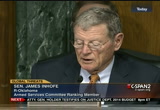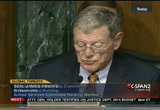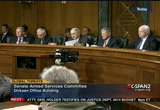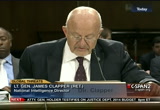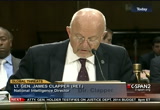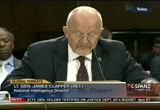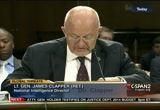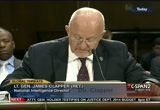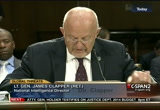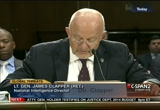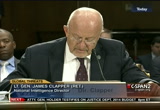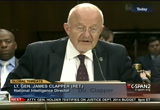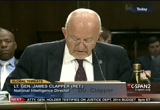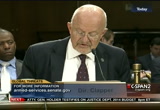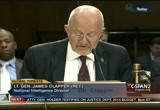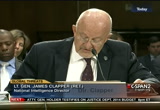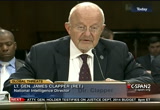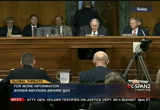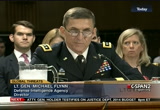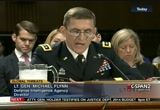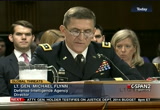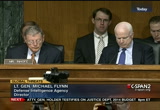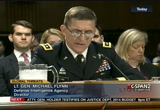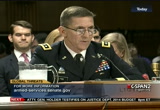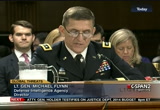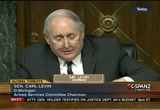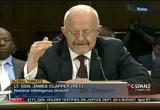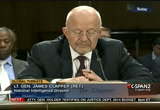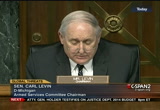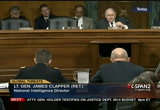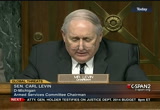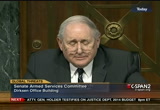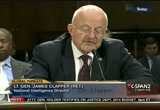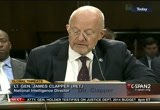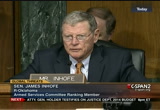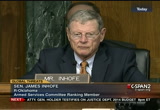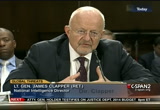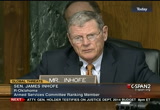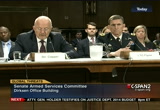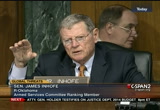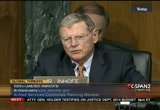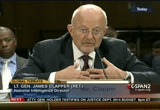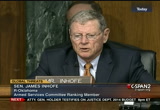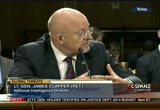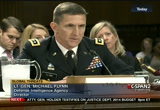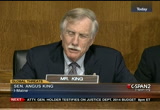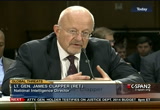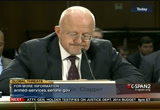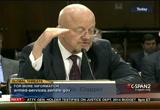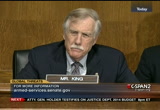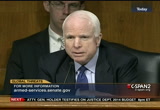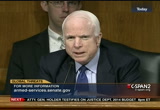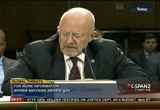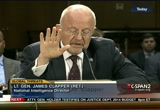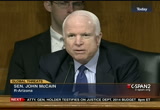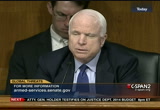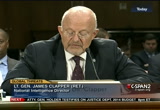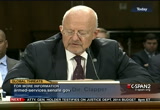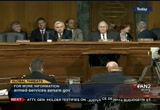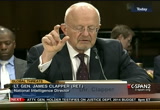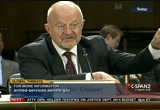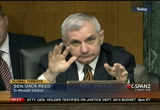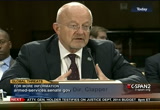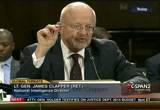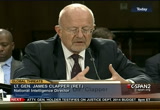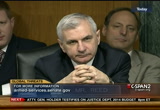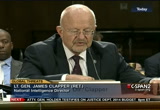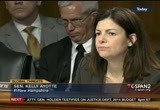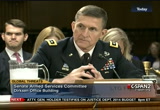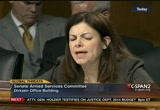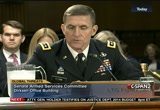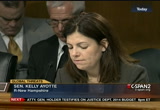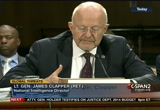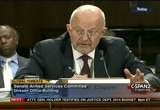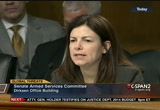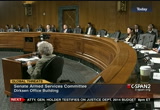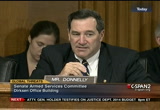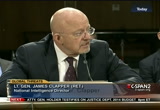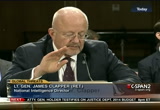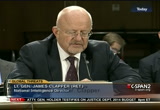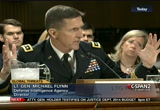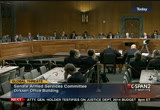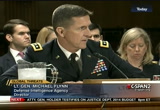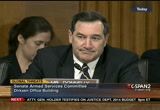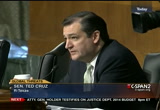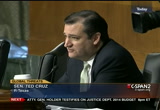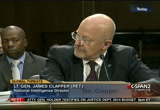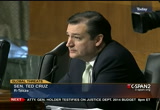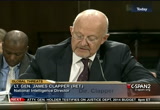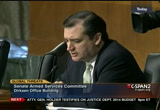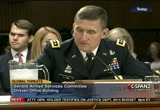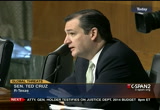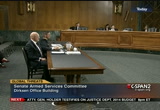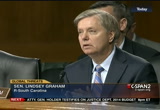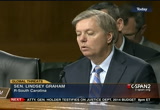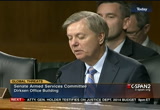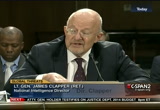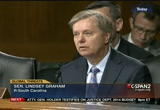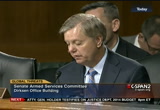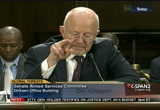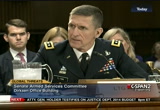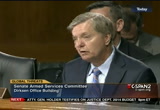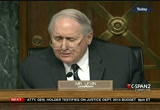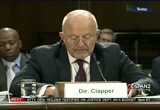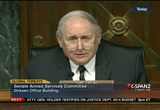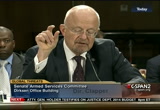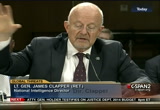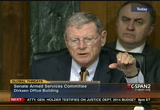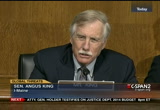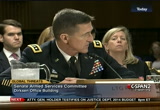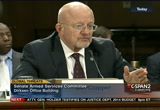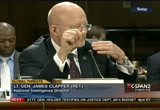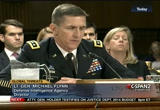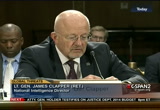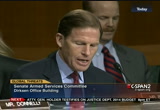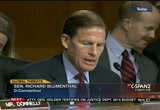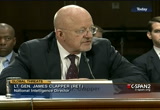tv U.S. Senate CSPAN April 18, 2013 5:00pm-8:01pm EDT
5:16 pm
a senator: mr. president? the presiding officer: the senator from montana is recognized. mr. tester: skilled that the quorum call be eviscerated. ferraro without objection, so ordered. mr. tester: thank you. thank you, mr. president. on april 21, , montana will be vitisapal. i extend a hearty montana
5:17 pm
weomeo every one of them. togeer they will visit the world war ii memorial. this journey will bring about a lot of memories and give them a deep sense of pride as well. what they achieved together seven decades ago was remarkable. that memorial is a testament to the fact that a grateful nation will never forget what they did or what they sacrificed. to us, they are the greatest generation. they left the cfortse comforts r families and communities to confront iw iwo jima. they won the war by defeating an empire and liberated a continent by destroying hitler and the nazis. to them, they were simply doing their job. they enlisted in unprecedented numbers. they represented the very best of us and made us proud. from a young age, i remember playing the bugle at memorial
5:18 pm
services of veterans of the first two world wars. it instilled in me a proud sense of respect that will be with me forever. honoring the service of every generation of american veterans is a montana value, and i deeply appreciate the work of the big sky honor flight, the nonprofit organization that made it trip possible. to worhe warrism i veterans making the trip, salou and welcome you toou natn' capital. we will always be grateful. and we will never forget your service or your sacrifice. with that, mr. president, i yield the floor. i suggest the absence of a quorum. the presiding officer: the clerk will call the roll. quorum call:
5:21 pm
the presiding officer: the senator from ohio. mr. brown: i ask unanimous consent to dispense with the quorum call. the presiding officer: without objection, so ordered. mr. brown: and i ask following senate procedure if i could speak as if in morning business for up to six minutes. the presiding officer: without mr. brothank u, mr. president. 75 years ago president roosevelt signed the mayor labor standards act. this legislation proposed by senator hugo black in 1932 ultimately ensured that american workers would receive a minimum wage, reasonable work hours, and an end to child labor.
5:22 pm
president roosevelt led our country out of the worst economic climate we've ever faced leading us to decades of prosperity by ensuring that hard work in our nation is met with two fundamental american rights: fair wages, decent working conditions. the minimum wage lifted millions of americans from poverty and began the step towards joining the middle class. in the 21st century, a fair, livable minimum wage can continue moving our country forward. even as corporate executives and wall street banks earn record profits, too many families are struggling. americans who work harks play by the rules should be had ard to be -- should be able to take care of their families. but fume femm too many people ie state are working harder an ever and barely getting by. nearly 1.3 million ohioans in places like chillicothe and mansfield work in a minimum-wage job, working full-time on a
5:23 pm
minimum-wage job in ohio pays about $16,000 a year because our minimum wage is a bit higher. the federal minimum wage today pays only $15,000 a year, $3,000 below the poverty level for a family of three. not much live on, not for families trying to put food on the table, fill up the gas tank, send their children to school, provide a safe place for them to live. the minimum wage in this country should be a livable wage. that's why i'm fighting to pass the fair minimum wage act t would raise the minimum wage to $10.10 an hour in three .95 increments then provide for increases based to the cost of living. the tip minimum wage now stands at just $2.13 an house of representatives the bill would increase it to 70% of the minimum wage. more than 1.2 million people in ohio would get a raise because of this bill.
5:24 pm
millions of people around the country in places like helena, butte, and billings would have an increase in their standard of living. the vast majority of minimum-wage earners,spite of what some say in this body, some 80% are adult workers, not 16 and 17-year-old high school kids. they're 18 and above, many of them supporting families. more than half are women. 18 million children, nearly a quarter of all american children, have parents who would get a raise. over the past two weeks i have met with people in my home state who earn low wages. i have listened to their stories. ms. walter, a server from youngstown, struggled to raise three boys. ms. day, a cake decorator from bowling green workers two jobs because the salary of one just isn't enough to for her two children. "i don't really need a lot but just a little more."
5:25 pm
this bill matters. it matters to the grandmother who workers the evening shift in a restaurant to babysit her grandchildren during the day. it matters to the elder care e.d.a. it matters to the working care families who work hard planed by the rules. increasing minimum wage to $130eu an huer will also help the economy, will increase g.d.p. by more than $30 billion over the course of three years, as workers spend their raises in local businesses. opponents to increasing the minimum wage love to say that people won't hire, it will cost jobs. it's actually the opposite of that. this economic activity created by more spending in communities as a result of more money in minimum-wage earners' pockets would generate 140,000 new jobs. that's why business owners support raisings the minimum wage. the owners of brothers printing in cleveland pay workers more than the minimum wage. it means they have less
5:26 pm
turnover, it means their workers have a better standard of living. it helps the community. they do this because it is the right thing to do. it helps them keep their best trengthens their businesses and our economy. plain and simple, mr. president, ensuring ar we is good f amica's it's good for america's economy. i note the absence of a quorum. the presiding officer: the clerk will call the roll. quorum call:
5:45 pm
5:46 pm
s. 743, and that the vote on the motion to invoke cloture on the motion to proceed occur at 5:30 p.m. monday, april 22. the presiding officer: without objection. so ordered. mr. schumer: mr. president, i ask unanimous consent the senate proceed to a period of morning busine with senators permitt to speak for up to ten minutes each. the presiding officer: without objection. mr. schumer: mr. president, i ask unanimous consent that the senate proceed to executive session to consider t following nominations -- calendar numbers 52, 54, 65, 66, 67, 68, 69, 71, 72, 73, 74, 75, 76, 77, 78, 79, 80, 81, 82, 83, 84, 85, 86, 87 and last but certainly not least in this chain of nominations, 88. and all nominations placed on the secretary's desk in the air force, army, foreign service, marine corps and navy, that the nominations be confirmed en
5:47 pm
bloc, the motions to reconsider be made and laid upon the table with no intervening action or debate, that no further motions be in order to any of the nominations, and that the president be immediately notified of the senate's action and the senate then resume-session. the presiding officer: without objection. mr. schumer: mr. president, i ask unanimous consent that at a time to be determined by the majority leader in consultation with the republican leader, the senate proceed to executive session to consider calendar number 60, that there be 30 minutes for debate equally divided in the usual form, that upon the use or yielding back of the time, the senate proceed to vote without intervening action or debate on the nomination, the motion to be considered made and laid upon the table with no intervening action or debate, that no further motions be in deto the nomination, that any statements rated to the nomination be printed in the record, that the president be immediately notified of the senate's action, and the senate then resume legislative session.
5:48 pm
the presiding officer: without objection. mr. schumer: i ask unanimous consent, mr. president, the senate proceed to the consideration of h.r. 1246, which was received from the house and is at the desk. the presiding officer: the clerk will report. the clerk: h.r. 1246, an act to amend the district of columbia home rule act, and so forth. the presiding officer: without objection, the senate will -- the presiding officer: without objection, the senate will proceed to the measure. mr. schumer: i ask unanimous consent the bill be read three times and passed, the motion be considered -- to reconsider be laid upon the table with no intervening action or debate. the presiding officer: without objection. mr. schumer: mr. president, i ask unanimous consent the senate proceed to the consideration of senate res 103 which was submitted earlier today. the presiding officer: the clerk will report. the clerk: senate resolution 103, to authorize representation by senate legal counsel in the case of steve shaumberg, senator
5:49 pm
mitch mcconnell, et al. mr. schumer: i ask unanimous consent the motions to reconsider be laid onhe table n interng action or debate. the presiding officer: without object mr. schumer: mr. president, i ask unanimous consent that when the senate completes its business today, it adjourn until 2:00 p.m. on monday, april 22, 2013, thatlowingheyer and the pledge, the morning siss be deed expired, the journal of proceedings be approved to date and the time for the two leaders be reserved for their use later i the day, and that following any leader remarks, the senate proceed to a period of morning business until 5:30, with the senators permitted to speak therein for up to ten minutes each. further, at 5:30 p.m., the senate resume consideration of the motion to proceed to calendar number 41, senate resolution 743, and immediately proceed to the cloture vote on the motion to proceed. the presiding officer: without objection. mr. schumer: at 5:30 p.m. on monday, there will be a cloture
5:50 pm
5:52 pm
very simple and very clear the purpose of the war and it is not to disrupt the social institutions of the self and everybody knew what that meant. it meant not to disrupt slavery. earlier today national intelligence director james clapper testified on automatic budget cuts and national security. he believes those cuts are making the u.s. less safe and he explained why during the hearing held by the senate armed services committee. it's a little more than two
5:53 pm
hours [inaudible conversations] >> good morning everybody. the committee meets this morning to hear from the director of national intelligence james clapper and lieutenant general, director of the defense intelligence agency spa capano current thfureat to the national securi. along with the national security agency, the national geospatial
5:54 pm
intelligence agency and the national reconnaissanceoffice and thinteencen etservices erts of the department of de that are also elements of the intelligence communy thatth direct clapper hits. director clapper while much of the information that you provide to policy makers in putting members of congress cannot be shared with the public because of its sensitivity and classification. the people who elected us to serve deserve the best information that we can publicly provide them. so we are glad that you and the general are with us this morning to do just that. among the challenges that we face is a self-inflicted wound, one with the fact that director clapper has rightly said amplify the other threats that we come from around the world that challenges the and prioritized cuts required by sequestration.
5:55 pm
this committee is interested in hearing from both of you today about the impact of the fy 2013 sequestration and the impact it's having on the intelligence community's ability to provide us for the national security. the self-inflicted wound is all the more unfortunate because the national security professionals already have plenty to worry about. as the most open and interconnected society on earth, the united states is uniquely vulnerable to attacks on computer networks that were critical to our economy. to that of barp of public services and national security. iran and north korea ar clerl ying ire fensi attacks. arewi china and russia possess formidable capabilities for cyber theft such as the theft of valuable intellectual property
5:56 pm
as well as the more traditional areas of espionage such as supply and on our military weapon systems, plans and keep devotees. china in particular appears to observe no limits on the theft of american commercial technology. it's a threat that cannot be tolerated and i hope we will hear from our witnesses about the extent of the problem and the steps we can and should take to counter it. the asia pacific region and another round of bill which runs from the dictatorial regime in north korea has caused concern here in the united states and among our allies in the pacific. that regime has announced its intention to resume plutonium production, has tested a nuclear device in february that it appears to have had a greater yield than previous tests and has threatened at any time to launch a missile that could further exacerbate tensions. we have read about conflicting intelligence assessments of
5:57 pm
north kea's abity to put a nuclear warhead on the missile. we hope our witnesses will be able to clear up that isue. in the middlet, iran continues to float the international community in pursuit of a nuclear program that is a significant challenge to the nation and to most of the world. while the diplomatic arrangement in which iran joins the responsible community of nations remains the preferred outcome obviously. there is a consensus in much of the world that a nuclear-armed iran is not acceptable and that all options rest become must remain on the table to prevent such an outcome. weook forward to the witness assessments of the nuclear program, the impact of international sanctions on iran, the significance of the upcoming elections and related issues. yesterday afternoon we received
5:58 pm
an update from the secretary of defense and the chairman of the joint chiefs of staff on the situation and syria. that situation continues to grow worse by the day with an estimated 75,000 dead in the population of refugees and internally displaced syrians now running in the millions. yesterday the secretary and the chairman indicated that questions about issues like syria's use of chemical weapons, the nature and composition of the syrian opposition coming and the extent of the ties between the front end al qaeda in iraq would be better directed to today's witnesses. it's one of the muslim nations experiencing rapid political change and of people. they hold promise and we've also seen in libya, syria and egypt and elsewhere that it can also
5:59 pm
have undesired effect. the witness's assessment of the phenomena and the challenges and opportunities that presents this would be very welcome. we've been engaged more than a decade now in afghanistan and despite the media focus on the negative, there are real signs that progress. they are taking the fight to the taliban on their own and plans to end the presence there by 2014 or on track.
6:00 pm
networking of terrorist criminal pursuit a nuclear weapons capability. those directly threat, our national security in the world well being. it is not fully developed to identify and disrupt such networking particularly regard to facilitation and financing mechanism. our witnesses this morning hold vital positions in helping us assist, understand, and counter these and other threats. we are grateful for your service, your advise as we consider the president's budget request. before i ask senator inhofe for his remarks. a closed session will be held following the open portion of this hearing, if necessary.
6:01 pm
>> thank you, mr. chairman. one of the reasons my opening remarks are always shorter is because i cross off things that you've already said in that dramaically shortens. i'm in agreement with your comments, mr. chairman. thank you to our witness for being here. it comes as a time when the nation's security is being challenged like never before. i might add that central africa too. and the middle east rising tensions with korean peninsula, iran's pursuit of nuclear weapons and deliver. infritswing cyberthrenst receding. and i'm concerned that such claims underlie the foundation naive view of the world. it's driving the administration's misguided
6:02 pm
search forward a peace dividend they don't believe exists. we went through that before in the '90s. i remember that discussion. it's depriving reduction to a time the adversary is there. we should be expanding ours. the cuts associated with sequestration are having a significant impact on the capabilities and the breech of our intelligence community. just the time when we are needing it the most. director clapper when asked about the affect that southwest ration on the -- sequestration on the intelligence community you stated, i've quoted you several times on this. i think it's profound, quote, we're cutting real capability and accepting greater risk for intelligence. this is not quite like shorter hours for public parks. or longer lines at the airports. for intelligence it's
6:03 pm
insidious. the capability we cut out today you won't know about that until you won't notice it. the public won't notice it. you'll notice it only when we have a failure. unquote. i think that's -- i believe in that. that ocerned about. not onlyl wthey be less prepared to deal with it. we know less and less about the tr natur the thras the intelligence community loses capability. we go down a dangerous bet. it's out of touch with reality and making america le safe. to explain how the current budget cuts. these in places like africa that already separate the lack of resources. we talk about the lack in africa. relative to other continent.
6:04 pm
what this all comes down is risk. risk means lives. we are concerned about that. as the challenge to our security and interest are on track to cut over a trillion dollarses from our national security budget. contrary to the best wishes of some. the threat to our security are growing not dedegreesing. again -- dedegreing. again, the issue there does effect american lives. thank you. >> thank you, senator inhoff. director clapper. >> chairman, ranking member inhofe and distinguished member of the committee. we're here to present the 2013 threat assessment, two statements a bunch of this will be recompetitive. i'm joined today by the friend and colleague. these remarking in the two statement for the record one from each of us unclassified in
6:05 pm
mo d classified collective judgment of extraordinary men and women of the inligeee community. as you -- the topic foremost on the mind of the intelligence community leadership is sequestration. i raise this in this hearing because the effect of sequestration amplify and magnify the threat that face this nation. i've seen a lot of public discourse on the impact of these. so let me now be blubt for you and for the american people. sequestration forces the intelligence community to reduce all intelligence activity and functions without regard to the impact on our mission. and my judgment as the nation's senior intelligence officer, sequestration jeopardize our nation's safety and security. the jeopardy will increase over time. in response to this, we started with a premise that the mission comes first. therefore two highest priorities
6:06 pm
are one, protect our most valuable resource. our civilian resource so it focus on the threat we face. and support overseas operation. we -- we must adjust to the budget crisis. in doing so accept the inevitable risk we're incurring. and i must tell you i have seen this movie before as inhofe alluded. twenty years i served the job he has now. we eweap thepce dividend. reduce the intelligence community by 23 thse ny stations,e cut analyzes, allowed overhead architecture -- neglected basic needs such as power, space, and cooling and let the facility decay. we badly distorted the work force. all that have was reversed in
6:07 pm
the wake of 9/11. thanks to the support of the congress over the last decade we rebuilt the intelligence community and the capability we have today. now we're not careful we risk another damaging downward spiral. and just repeat the quote, unlike more "issue" -- impact like shorter hour at the park and longer security line at airport it will be garage l and almost invisible until you have a intelligence failure. with that is a backdrop let me turn to a brief review of global threat trends and challenges.mad to. i will say that in my almost fifty years in intelligence, i did not recall a period in which we confronted a more diverse array of changes around the world. if it makes sequestration even more -- [inaudible]
6:08 pm
the serious threat assessment our threat environment is changing. threats are more interconnected and viral. defense which it first -- disruption with the u.s national interest. i would ketrn to a few of the issues e identify in the statement for the record. our statement to the lead was cyber. as mor more state and demonstrate actors gained expertise. it's important to reach a global threat cannot be overstated. this year our discussion natural resources also more prominent because climb in disease and competition for natural resources and huge national security implications. many import are extreme war and food stress that can destablize governments that can trigger conflict. on the issue of terrorism, the threat from al qaeda and the potential for a massive coordinated attack on the united may be diminished.
6:09 pm
but it's more diffuse. as the president stated on tuesday about the boston marathon bombing we don't know it was planned by an group effort or individual act. lone inspire our affiliated group are determined to attack. the turmoil in the arab world brought a spike in threat to u.s. centers. a new government in egypt and libya along with ongoing unrest. and the ease and other regions of the world extremist can take advantage of diminished cowrpt terrorism availability of weapon, and internal stresses. most especially a high proportionate unem employee id resentur wealthand lture.py [inaudible] it's another persistentth to u.s. iner as you alluded to, north korea
6:10 pm
has demonstratedapity that threaten the united and the security environment in east asia. north announced in february it conducted a third nuclear test vow to restart the nuclear reactor. last year displayed what appears to be a mis. we believe he has taken initial steps toward fueling the system at that time remains untested. it also uses two launch vehicle to put a satellite in december. plus demonstrating the long range missile technology. they have been accompanied with belligerence end against the united states and south korea. north korea has not; however, fully developed, tested, or demonstrated full range of capabilities for a missile. characterizing such capability for us in intelligence is a complex process. it is indeed rocket science.
6:11 pm
rewe're dealing with many shades of gray here not black and white. comment open the revelation of the di assessment on north korean nuclear weapon capability. the statement in question was one sentence and mistaken miscategoryized as unclassified. but this rev lace is a luster for the standard de la -- in what we know in contrast to what we temptto impe from the many things the nuclnt on rthrs inhe are no exceon. intelligence community have milar or differing positions that can be varying degree of confidence. it had is where it plays havoc with certitude. i'm sorry to disappoint to the
6:12 pm
contrary it reflects an integrate and collaborative competitive analysis process. we are, by the way, in the process of generating an intelligence community assessment on the matter which will formally engage all member of the intelligence community. if we agree, great. if we don't that's healthy too. we will portray the various view of the community to our consumer to include consumer number one. dia is a crucial part of the intelligence community and the views are valued and respected. i say this as having proudly served as a director two decades ago. the agency and the great people and the current director, i have confidence. we welcome thediituss details id session. i make this interest in protecting the fragile intelligence we are on north korea as well as avoiding further advancement of the narrative by public discussion and media hyperventilation.
6:13 pm
adversaries watch these proceedings too. let me add historical perspective. i serve -- i put my finger print on the national intelligence estimate on weapons of mass destruction in iraq published almost ten years ago. after wards the community was criticized for group think for not vetting source and questioning and suppressing and dmisessing alternative views. so we learned some hard lessons from that experience i can assure you. that said, the ic continues to monitor development and anticipation of north korea's next step. moving elsewhere, iran continues to develop hnica x in uranium, nuclear reactor, weaponization, and missiles which can be draw if it decides to deliver nuclear weapons. clearly tehran has the scientific technical and industrial capacity to produce
6:14 pm
them. the central issue is the political will to do so. such as a decision we believe would be made by the supreme leader and at that point we adopt know if he'll decide to build nuclear weapons. the united states and our allies are tracking serious stockpiles particularly the chemical and warfare agent which is are part of a large complex disperse program. it'sed advance has the potential to inflict mass casualty. the increase dpli regime having found the ease can escalation is not working appears willing to use chemical weapon against its own people. all th envernmental groups could gain access to such terial we rceive many claims of chemical warfare use in syria wet serious and investigate them. wean't oideadditional details in the setting to
6:15 pm
prt e agile ritical intelligence we need to assess the situation. we can talk about this in closed session. looking at geographic threat around the world, some nations in the mideast and north africa are making progrs toward dem critic rule most are experiencing violence. in iran leaders are exploding the -- exploiting the unrest in the arab world and gorped mine the united and allies. tehran also faces a worsening financial outlook in the fall. it would be a huge strategic loss for iran. iraq tensions are rising. to this point, al qaeda in iraq has not mustered the strength yet to overwhelm iraqi security forces and iraq is producing and exporting oil at the highest levels in two decade. islamic actors have the cheap
6:16 pm
beneficiary. after more than two years of conflict in syria the erosion of the regime capability is accelerate. we see it in the territorial losses, military manpower, shortfall and logistic defishty. sei. the opposition is slowly but surely gaining the upper hand. the days are numbered we don't know the exact number. violence and conditions have lead toineas cvilian casualty to at least 70,000. the violence and economic dislocation lead to 3.6 million syrians being displaced and 1.3 million refew agree having fled which intensify the pressure on the neighbors. egyptian elections originally scheduled for this month will be pushed to the fall. the longest postponed the greater the potential for more
6:17 pm
public dissatisfaction. in africa we're monitoring unresolved discord between saddam hussein, fighting in somalia, the collapse of government and northern mali and renewed conflict in the great lakes region. the security hinges on france's earth to undermine terrorist effort in the region as well as by effort by the africa international support mission of mali or future u.n. peace keeping operations. west african countries deployed troops to stablize northern mali. moving to asia the taliban diminished in some area of afghanistan but is still resilient and capable of challenging u.s. international goals. the coalition dr down will have an impact on afghanistan's economy which s likey decline after 2014. impact on the government has not substituch ndedyol antax reorm. they face no real prospect for growth.
6:18 pm
on a somewhat more positive note. the arm force continue the -- triable areas which have been safe haven for al qaeda and the taliban. and pakistan established national assembly election for may 11. a transition to the new government peacefully. in china last month the country continues to supplement the growing and oppressive military capability by bolstering maritime law enforcement to support the claims south and east china sea. russia continue to resist putting more international pressure on syria or iran and display create sensitivity to missile defense. closer to home despite positive trends latin america weak ends to slow recovery from devastating natural disasters and drug-related violence and trafficking. in venezuela the presidential
6:19 pm
election occurred four days ago. officially announced result indicated candidate nicholas won in a narrow victory. so in some given the magnitude and complexity of our global responsibilities and comprehensive intelligence, in my mind, has never, more important or ursubsequent. i have trouble reconciling this of sequestration. with that i thank you for your attention and now turn to general flynn for his statement. >> thank you. good morning chairman, distinguish member of the committee. thank you for the opportunity to testify for your continued support to the dedicated intelligence professionals of the defense intelligence agency and entire defense enterprise. many of whom are formerly deployed directly supported u.s. and allied military forces in afghanistan and 141 countries and 262 locations around the
6:20 pm
world. i have been the director for nearly eight month now i cannot emphasize how proud and privileged i am to serve our nation in this capacity. as our defense strategy highlights our nation at the moment of transition. the global security environment as director clapper just stated presents increasingly complex challenges and growing list of threat and adversary. and demands on the united states intelligence system have skyrocketed in recent years they are only expected to increase. the united states faces an uncertain security environment marked by a broad spectrum of dissimilar threat from nation states, nonnation state actors, highly adaptive transnaiol terrorist ne proliferation of weapons of mass destruction, and looming and dangerous threat of cyberattacks against our defense coour nation'scritical infrastructure. i view this latter threat as the
6:21 pm
most dangerous today. the opening statement along with my more tr stat the record reflects dia's best analysis and based on the worldwide human intelligence, technical intelligence, counter intelligence, and measurement and signature intelligence collection as well as our world class national level document and media exploitation capabilities. additionally our mission is executed in close collaboration with our intelligence community partner, international coalition partner, as well as utilizing the full range of open sources available in the information environment today. our customers run the gamete from the president of the united on down to our war fighting combatn't commanders. the most important are the soldier, sailor, airmen, and civilians who serve our nation and willing to stand in harm's way to protect our country. without restating what clapper said. we face a complex and global
6:22 pm
operational environment characterized by a multitude of actor. the unprecedented array of threat and challenge include the continuing threat from the taliban insurgency in afghanistan, al qaeda and affiliated terrorist organizations in the middle east and africa, terrorist havens in pakistan, the popular upheaval in the aftermath in syria, egypt, and elsewhere in the ear missi development.tained north korea's missile provocation. the growing seriousness of cyberthreat to the defense industrial base, our nation's critical infrastructure, government networks, and the american business community particularly from china and iran. and finally the growth in cha's equipment and military power. all of these place significant demands on the defense intelligence agency and the entire comprise. as stated above, i believe the most prezzing threat facing our country is the threat from cyberattack. the daily occurrence of attack on a damaging an variety level.
6:23 pm
they are not only persistent and dangerous. the likelihood of damage is real. potentialed aer adversary increasingly more -- cyberattack remain an important and increasing transnational threat to the security of the united states with state actors such as china, russia, iran and north korea integrated these capability to the intelligence gathering method and warfare docket rain. malicious actors have demonstrated the willingness, the limited capability to use cyber as a means to attack u.s. interests. one final point regarding cyberattacks we need to keep in mind. behind these attacks arh beings. some are demonstrate individuals, some part of state sponsored networks, but each with increasing capability and harmful intelligence doing damage to the national security. lastly, since the diams-
6:24 pm
given the enduring impact of the arab spring, the ongoing turmoil in syria, persistent territorial dispute globally, and emerging transnational threat previously describe. they underscore our need for effective strategic warning. strategic problems such as proliferation of weapons of mass destruction, state on state conflict, instability, resource scarcity, and terrorism remain at the forefront of u.s. warning concerns. however, strategic surprise not only as a goal of the deliberate deception efforts by the adversary but extending from human to social dynamic the small and varied intersection with no relevance to the department of defense can rapidly evolve and radically alter u.s. policy. to uncover these challenges, dia and partnership with the intelligence community are combat and commands and the closest international partner monitor the intersection between military, political,
6:25 pm
technological, economic and social development. we place these events in the context of history, culture, religion, and physical and human geography. our ability to understand these interactions provides a decision advantage in the face of unforeseen events to anticipate surprise. technological change has the potential to create surprise. less developed country and demonstrate actors may wurnlg with invitive capability that can counter some u.s. military capability. proliferation of advance technology and the rapid improvement in commercial will aid development of new commercially enabled threats and improvement in communications will speed the proliferation of advanced and commercially available technologies. in order to meet these challenges, dia through our strategy and transformative vision 2020 driving change to has undertaken initiative to increase the efficiency of dia and the defense intelligence
6:26 pm
enterprise. the single biggest component of our need to take the right lessons learned and closely integrate our intelligence operation with the uniform service, the combat and commands, the allies and coalition partners. to conclude, today's focus on combat operations in afghanistan against insurgents and transnational terrorism around the world does not preclude the potential that other threats will come to the floor. including conflict among major countries that could intersect vital u.s. interest. defense intelligence must be able to provide timely and actionable intelligence across the entire threat spectrum. in close collaboration with the intelligence community, sharing more information a courthouse intelligence discipline and the nation's closest ally. men and women of dia and the intelligence comprise know they have a unique responsibility american people and take great pride in their work. i'm honored and privileged to serve with them and present
6:27 pm
their analysis to you. a and the entire compromiser y confidence. your support vital to us as well as our national security. i look forward to answering your questions. >> thank you, general. we'll start ith a minute first round. director clapper, iran has been in continues to enrh uranium to stockpile the uranium currently under iaea safe guards. my concern; however, iran might be able to stockpile enough uranium to enrich weapons and produce nuclear weapons in a relatively short period. your prepared statement include an important assessment that iran could not divert safe guarded material and produce a weapons of mass destruction before this activity is discovered. can you tell us about how much
6:28 pm
warning you believe we would have? clearly -- we adopt hold the most likely -- our assessment is that if they were to move to highly enriched uranium which would be a dead giveway will there's no other reason to be produced other than a weapon. the most likely scenario they could it covertly. it would lengthen the time to which they could develop a testable single weapon. brsigtiesf they were to do a t, which is as you indicated under safe guard and ae ia a super vision. that's a bellwether. that would be a warning. if they dorp to do, which we
6:29 pm
think is east likely scenario, it would be a fairly brief time as we indicated in the statement. a. >> a fairly brief time? on how the industrial process involved and all kinds of factors that can affect that time. we're talking about probably a period of months not years. >> all right. and they made a decision in your assessment to reduce nuclear weapons? >> they have not. we continue to hold that they have not yet made that decision. and that decision would be made by the supreme leader. >> all right. >> can you give us yof th impace current sanctions regime against iran? it is having a huge impact on the economy. no imre about that. if any measure you use, inflation, unemployment
6:30 pm
unavailability of commodity, et. cetera, it's having tremendous impact on the economy by any measure. that said, it is not induced a change in the their policy. general clapper, both, relative to pakistan, has pistan change the its sragic collaboration. is there any chang tt we have determined in pakistan's so far unwillingness to dealith afghan taliban. sanction ware in pakistan. is that still they're on the ground position that they're not going take on or deal with or put in jeopardy the afghan
6:31 pm
taliban that is inside pakistan. >> the primary strategic interest of pakistan is india. and so they view whatever they do in afghanistan through that lens of their preimminent threat and what they are most consumed with is india. to the extent they can maintain visibility and influence in afghanistan, i believe they will continue to do . >> there's no we have discerned in pakistan and so far unwillingness to take on the taliban inside pakistan. the of afghan taliban. >> inside pakistan if the sect to the taliban that is in pakistan certainly poses a threat to the pakistan any. they have when they could . >> the afghan -- i need to point
6:32 pm
out lost thousands of troop in ursuit of . >> im talking aou the afghan talib hey have given sanctio ware. >> that's crrect. >> that's correct. re that? >> not basically. in term of north korea, the difference publicly stated between the intelligence with large and the dia on the issue of whether or not there is -- north korea has a missile in your judgment a small part of a bigger picture, director clapper. and as a new understand nuanced issue as you point out. i would think that because of
6:33 pm
the public description of this, the best way to is to deal with the nuanced. the best way to deal is to know about it. what i out what we know in fact we outline and what we impute from those facts and that's why you get to the differences in confidence level people have. >> since it's now the public and give us any idea why you think it's nuanced. give us what that difference is it has to do with the confidence level in the ability of the north korea to make a weapon that work in a miss work.er we or the north korea whthey have such capability will actually work.
6:34 pm
and so dia hasaigher the community on thatthe rstof capability. can you tell us whether that redline has been cross the. it's a policy question, and not one for intelligence to comment on. >> so there is no assessment that you have made. >> without etting in o public have you made a assessment as to whether or not it -- . >> i have not. nor will we. >> all right. >> you talk about the global jihadist movement, director, if your opening statement. is the continuing -- [no audio]
6:35 pm
recruiting tool for the global jihadist. >> this has been a long, long subject of debate. ever sin guantanamo was established, and there are those who believe that it in the past it has been uorit certainly in jihadist lteature and onte ne l, doou e pinio on that? >> i agree with what director clapper is stated here. i think we have to pay attention to not just guantanam but other places where individuals are being held by other countries
6:36 pm
and pay close attention to what happens to the position of those individuals in other countries. as it might relate to their returning of the battle field, so to speak. >> thank you, i wasn't going mention guantanamo. -- [inaudible] but i like for the record for each of you to tell us and to tell me what do we have? is an at alternative to guantanamo? i think it's a great resource. it's been used political i are in the wrong way in my opinion. the statement you made, director clapper we couldn't find in your written statement. i sent for and i'm going read it quick here. i was overwhelmed. in almost fifty years of
6:37 pm
intelligence i don't remember when we had a more diverse array of threats and crisis situations around the world to deal with. mr. chairman, i think that's about a strong statement i've heard aofn e withhe statement? >> i do. director, clapper i was going to bring up the last time we went through this. i was in the senate at the time we went through the last euphoria with the cold war. we did a lot of cuts in terms of i have one that 30% in our capability. at the same time china during the same decade of the '90s was increasing by about 300%. do you see what other similarities you covered that. what other similarities do you recall happened during the peace
6:38 pm
dividend back in the 90s and what we're facing today. anything ease? >> well, looking back, because of the cut we're taking i often wonder whether we fail to fully appreciate the onsite of in front of terrorism. i remember i first got religion of terrorism when i did corporate towers information in, and i had just left dia as director that oured of june in '96. i leftdirtor neptember of '95 and had a case to go back and korea -- critique myself. i saw how little the agency was devoting to terrorism. a lot was because of, i think, the cuts and we need to remember
6:39 pm
the lessons. i fear i've seen the movie before. >> that's a good way of putting it. director clapper, i said sometimes we say things so many times we forget the original source. i remember though back in, i think '07, our intelligence did come to the conclusion that iran was going to have the capability we're looking at now by 2015. that's the first time i remember that date and that will hasn't changed much sense then. am i accurate? what capability you're referring to? >> nuclear capability in delivery system. >> well, it a-- that date is good. the are iranan are puin los that teoulden our
6:40 pm
continental capability. we, you know, the belief is that by the first time they would be ready to do that would be as early as 2015. >> for both of you recently we had asked the general this question. we said, do you believe that current economic and diplomatic effort to stop iron from acquiring a nuclear weapon capability have been successful in his answer was no. do you agree with his answer? >> my answer i've been asked about that was that the sanctions are having a huge impact on the my. it's not intewsed change in their policy. >> how about you, general? >> i would agree with their behavior is to a near intelligence to achieve that capability. >> one of the concerns i have, you covered it director,
6:41 pm
clapper, briefly anyway the continue continent of africa. we were concerned when it was under three commands. now it's under one. but the resources for the demand come from -- we talked to both they're very much concerned as i have been for a long time in the lack of the even currently without reducing resources due to sequestration. the lack of resources we have facing the potential threats on that. you talk about mali, some of this going on now. we remember going through the somalia problem. southern sudan. i've been there twice. i have seen this new country being developed and i'm concerned about the fact we were short of intell in that whole
6:42 pm
region. it's not just the country's you mention. you didn't mention nigeria. there's other places in west africa u uganda, once they are developing the oil resources down there, then have money merges, the problems emerge with them. we're going -- i'm sure have to expand our intel our isr capability in that area. do you have any thoughts about the part of africa you did not mention that are potentially a great threat? i think you covered it well. i would comment if you look at northern africa say from on the west to sudan on the east it's 475 million people. imomportantly, most
6:43 pm
importantly a very high proportion of population areyouo . >> yeah. >> frustrated and are ly attracted to the yes jihadist. that whole area, i believe, is in the other countries you mention, i think going or it a tremendous challenge. a big challenge. we don't cover -- and so we have focused on area the. the challenge would be how to bring to bear more particularly in the isr to africa. >> africa is unique in another way too. you can find a place right now where we have adequate intel. there's not a real threat there. when they change leadership in
6:44 pm
these countries, when the bag bone were taken over. the state department doesn't agree with my assessment of this. when they were taken over you have a new threat out there and to stay ahead of that while it wasn't necessary to get a lot of intel prior to that time under the regime, in my opinion. now it is. because you're dealing with people who have terrorism in their background. so i would hope we lo some of the potential problems that are there. they are real in turythanai man. >> thank you very much. senator king. >> mr. clapper, director clapper, you have given us an appalling list of risks. today. a long list of threat and problems we face and you started your testimony talking about the
6:45 pm
effect of the sequester. i think it's important to emphasize that the sequester is not a one year proposition. it's written in to law to continue. given that list of threats, and given the increase in risk that is occasioned, it would be fair to say that the sequester i.t. is the most security risk this country faces right now? well, it's certainly as i indicated in my testimony, it is consuming us, the intelligence community leadership for what it what we see happying to the capability and importantly the expectations of people seem to have. for our having this global insight. that's going to be very hard. if we sustain sequestration through 2021, which the law calls for, in fact if we go through another year of sequestration, as i said in my testimony to the committee and
6:46 pm
the stay before the house imedges committee. we are going have to rethink ence ecau like to add this.be the same. i want to e reemphasize the senior leader in the ic. in just to reemphasize what director clapper talked about. with do not want to damage that vital component of our capability. the sequestration, as you know provides us almost no flexible. not just this year but over the long haul. our adversary won't take a strategic cost to collect ourself. the real cost and clapper eye lighted it is what i want to describe as public insecurity and the potential for strategic surprise. and we really won't know what we
6:47 pm
have missed given the potential damage to that sequestration will have on us. i think the word insidious is appropriate. >> we won't know what we missed million something blows up. we asked this the other day in afghanistan adds we're transitioning out. it seems to be me one of the key questions is who do the people of afghanistan support? are the withlligence the karzai regime? are they with the government? are that the they with the taliban? what is the status of the sort of on the ground public opinion in that country? >> i think it's very much a mix bag. i think the forthcoming election
6:48 pm
assuming it's held on time. all right generated a great deal of political activity and i think that's going to be a real indicater of what are these like? and the areas controlled by the taliban, that's principally in the rural areas. karzai has more attraction. bear in mind, afghanistan is very much a triable country. somewhat artificial in a conventional sense we think about countries. loyalty, i think, lie mostly on triable basis.
6:49 pm
one other more specific question on the sequester and the dollars. i read the figure you have cu i dod, directoraper.alusolu tcorrect?th. >> absolutely. we had to about $4 billion in seven months and classified setting i would be happy to go through the capability we are cutting. >> and that continue over time. >> over time you reach the number of amount of nominal dollars you were at in 2012. >> that's correct. if you start with the basic 2012 and if you take sequestration -- one other question on iran. we had discussion this morning in "the new york times" there was an article headlining a report lead by a former
6:50 pm
ambassador picker. he was well respected in the field who argues that the sanks in iran are not effecting the decision makers, and in fact may be driving them in the other direction. could you comment on that? >> that's certainly oneame timet right now we don't think that decision has been >> it seems to me with the problem with sanctio against countries that autocratic the sanctions effect everybody on the street. they don't necessarily affect the decision maker and the supreme leader could hang on an not ave any problem gettng
6:51 pm
bred in the marketplace. i think it can. perhaps don't know that perhaps this will play out in the forthcoming iran indiana election. yes. and have the sort of faction we put up a candidate not exactly embrace the supreme leader. this could create an interesting political dynamic. i don't know. >> thank you, senator.
6:52 pm
senator cane. -- mccain i thank the witnesses for being here and their continued spfs i i don't want to beat a dead horse on the sequestration. i believe both witnesses, is it true continue our ability to provide the intelligence infmaon -- you seem to be living in parallel universe here. we get testimony from you and other leaders. there's nothing from the white house and nothing here in the congress to effort to repeal what is clearly a threat to our national security, but some of us will keep on trying. general clapper, you and the secretary of state, as we know
6:53 pm
now, and then secretary of defense an the chairman of joint chief of staff supported arming the rebel. >> i have never spoken publicly about a position i took in that regard. i don't think it's appropriate to do that. i don't think it's appropriate to talk publicly. >> you don't think it's froapt talk to members of congress about your views on the situation that is going on where me 80,000 people have been [onsacred. what advice do you congress as far as arming the rebels. >> i b at at this point there are loss and lots of weapons in syria, and if we're going expend resources in
6:54 pm
support of the opposition, i'm not -- supply additional weapon i are to the opposition will have a desired impact based on cost benefit. >> would a no-fly zone do that? >> that's sufficient geography on the ground. that's a possibility. but doing a no-fly zone even a portion is not a truly undertaking. there are -- as i mentioned tremendous array of weapon i are in syria to conclude a sufficiented air defense capability. depending on who is operating
6:55 pm
it. so a no-fly zone would not be without cost. mussel in the right places we could establish a no-fly zone. >> well, patriot missiles i'm getting out of my league here. this is s wh e dertmentf fense. we that's essentially aint apon. i think the theorha you can position patriot missiles out of syria andovide security over a zone. that would be given the naicht patriot weapon which is a point it's not a area of protective. >> you know what is fascinating here, general? now you are saying, and so did the chairman of joint chief of staff, the situation has key or it your rated so much that you
6:56 pm
now have questions whether we should supply weapons to the rebel or not. which argues we should have supplied them back when you recommend it according to published reports as well as the secretary of state, as well as the chairman of the joint chief of staff. it's a remarkable. so now you and the administration sit here and say we don't know where the weapons are going. maybe if we helped the people who were fighting from the beginning before all the jihadist flown in to the fighting in israel, we might have been able to have some beneficial effect. meanwhile, we sit by and watch 80,000 or so the country in the -- wouldn't you agree that it's lebanon and jordan has been destabilized. >> they have a huge impact on the neighboring countries. jordan, lebanon, turkey, iraq,
6:57 pm
[inaudible] a number of refew agree. not to menti the humanitarian aspect but over of the fighting. >> thank you. is this support flown in to syria over iraqi air space? >> i'm happy to talk about that in closed session. >> okay. do you believe iran will seek to keep assad in power at all cost. >> absolutely. his fall would be a huge strategic loss to iran. >> a hugh strategic loss to iran. yet, we don't seem to know any real way to assist them. that's quite remarkable commentary on the capability. how would you characterize russian interest within syria? >> well, that's represent their sort of last in the mideast with
6:58 pm
they have influence. it's been a huge weapons client of theirs. there is a generalled a version to just being in opposition to us. as well -- from the homeland at the standpoint of jihadist influence. so there's a number of factors, i think, that motivate the russians, but i also think the they are concerned about what would follow aside. they are taking people to iran and training them and sending them to syria. >> there's some going on, yes. >> there's an article in the "the wall street journal," i think yesterday, u.s. fears syria, rebel victory for now.
6:59 pm
7:00 pm
bear in 13 out of 14 provinces and starting to establish municipal services, provide humanitarian aid come food, hospitals and sharia law wrs. >> all of this might have been avoided if we hadn't sat by and watched it happen. i thank you, mr. chairman. hank, sara mccain. senator reid. >> thank you, mr. chairman. thank you for your testimony on surveys. i have more of a procedural question. as i understand it, your preparation is part of the defense appropriations bill of the classified annex that we did in fact pass a defense appropriations bill. we didn't do a lot of those.
7:01 pm
within the context of that though, were you able to achieve at least flexibility and prioritization in order to cope with what we are recognized as decreased funding? >> the national intelligence program, which i manage straddles two independent agencies. the bulk of the program is carried in the department of defense budget. so not to get to the end of the program was divided into the 700 planned program activities, which covers the entire extent. every one of those had to be equally taxed. the congress imposed a more onerous, morerestrictiverra money from ppa to ppa.my ato m
7:02 pm
i have these small but not a lot oney anof them are only people. for whatever reason, they decided there needed to be more control over the national intelligence program. the effect of the fy 13 appropriations i did help as assume that it allowed us to move some money around city could move the money into the pot sorority committed to by virtue the fact we are fragments months of the fiscal year before regarded though. it would've been a disaster without it. the downside to allow start, which was good, but for most accounts with three specific exceptions, which i can't discuss here, with less money at the end of the day with the appropriations act and the impact of sequestration was doubled because we had to take
7:03 pm
and 79, said the rail cut fares about her 10%. >> the realistic impact is helpful. it provided a context to things they might be allowed to do. we have a macro issue of the sequestration, which everyone recognizes as huge and accelerating impacts on your programs. either legislative authorizations on the intelligence committee thatdo fu the ability to whatever the top plane and spend it more wisely? >> as i said, wepa r fair share the tax and we have done it in such aay we can avoid where we protect our people from furloughs.
7:04 pm
so i guess my wish list would be some relief on our ppa structure where the street may like the dod, where i have larger ppa's. >> that is something that could be done not to say microsolutions sequestration, but in the last -- >> in the bill, senator feinstein and senator chambliss thought to do that and not intelligence. parking back to the 90s, one of the themes that seem to be sacrificed weiss to our chagrin. can you balance those programs? without getting into detail obviously, is there one area that is going to suffer more than the other organic aspect to
7:05 pm
the question, can make you the flexibility to manage better? >> again, not to be a johnny one note, but in this environment, the one thing i ask for is more latitude on how we take the cut in allowingu to put the money where the most important payoff is. with respect to the question you raised commissary, the approach i've tried to take in the last two years is to try to protect in the best and most capabilities that give us the most general coverage. that's why in very strong on sustaining our overhead reconnaissance capability because that covers the earth, nied area o not and similarly come even when retain in the late 90s, human capabilities iexy important. that's why i'm a huge propent
7:06 pm
oforickers is doing, which isn't an increase as much as a reshaping, recast in our organization. i started in 1992 with better integration with the fbi and the cia. marquand@case officers. this unique capability no other parrot in the intelligence community can render. estimate reductions, we have to focus much more on quality and the quality of investments and are not going to have safety in numbers. >> i have one quick question that's come up a number of times. there is clear evidence, public evidence of iranian involvement.
7:07 pm
my presumption though is there are regional forces who are operating in side theory, who are supporting the effort of rebels, said this is not a situation where there is only one player, one external player in the field and that's the radiance. is a complicated situation, where there's conscious and capable people from other countries on the ground assisting the rebels. yes, that's true. it isa very complex situation there. one of the phenomenon that makes even more difficult to access good guys and bad guys if they will portray a different base
7:08 pm
depending whether they look westward or some other way. that makes it even more complicated. one of the great things we have is the magnet theory has turned in to for foreign fighters. the europeans are very concerned about the 400 plus european that have gone to syria to fight the great site. so it's a very, very complex situation and there are bad guys and good guys and large number of shades of gray in between. >> i hope the sack around comes back. i just simply say we are proud of you and your brother. thank you. >> thank you very much. senator ayotte. >> thank you, mr. chairman. i want to thank the witnesses for being here today in service to our country. i wanted to ask in a written
7:09 pm
7:10 pm
united states withdraw from iraq without a follow-on force. >> how they previously characteristic? as i understand in your wrist testimony. the iranian officials view the u.s. military withdraw from iraq as a strategic defeat for the united states. is that true? >> what reassesses their perception? >> how my tehran -- [inaudible] how do you think god would be viewed by iran and what activities do you think that would precipitate in afghanistan by the ukrainians? >> well, the ukrainians never care having a senator of their borders.
7:11 pm
she says they will calm the departure from iraq, so will they from afghanistan. in their interest of course this sustaining their influence in both those neighboring countries. in iraq, they make that attempt in afghanistan don't think be a successful or influential afghanistan as they might be in iraq. >> general dunford expressed concerns in our hearing the other day. what is a rant every in iraq, including aerospace? >> to maintain i.q. worry about is they are supplying of weapons or any in iran or afghanistan. >> on your first issue, we have
7:12 pm
to understand how you're defining precipitous and also the implications of the perception of the region and clearly area as they continue direct transition -- we all need to pay attention to how we are doing that. i think general dunford type that out clearly in his testimony. aners arsomething wehatregion pay close attention t i would add potential training to that as well of some of the capabilities and weapons systems we have seen to apply the inside of afghanistan, particularly the west. >> when you say training, just that we become aware of over the
7:13 pm
years. >> director clapper, wanted to ask you about the september 11 attacks that are diplomatic solution of benghazi and wanted to ask you about the prior attacks on our conflict, both on april 6 in june 6 that occurred before the september 11 attack obviously were four brave americans were murdered. wanted to ask you about the intelligence community's assessment of those attacks and whether you are the dni rich president obama or secretary clinton about the preceding attacks and his chariot and security situation benghazi prior to september 11. >> i did not personally briefed on, but we reported those polled for intelligence vehicles.
7:14 pm
>> your intelligence vehicles would've included the attacks on the consulate? >>es >> we had a general idea of the situation in eastern libya. we probably didn't have those fidelity on the exact situation in benghazi, but we certainly know what the lack of control the central government had over the militia is not part of the country. that's an historical tradition and continued even after the fall of gadhafi. >> he said the intelligence briefings prepared by the dni talked about the prior attacks by reference in april and june prior to september 11 attack. but they also include the assessment of the british
7:15 pm
closing a facility? >> yes. >> is the intelligence at the chain of command despite not having a specific conversation with the prside just to be played enough conversations with secretary clinton about this issue? >> we had many conversations about it. i don't recall specifically a conversation prior to the attac. we could have, i do start remember. >> i think both of you. i also wanted to ask genal flan about the chinese development of a fifth generation fighter and where they are without analysis or comment on comments on the russian development of the fifth fighter. the >> a couple of more technical
7:16 pm
answers would have to go to closed session, but it was just off her the capabilities we are seen being developed in investments made by china and russia are concerning. we pay close attention to these investments and capabilities and we work very closely with not only our commands in various theaters, both eucom and pay column, but also our strong partners in the region to ensure we clearly understand how good these capabilities are. >> thank you general. director clapper, given the assessment of the technology community, what lessons do take the situation that happened in benghazi? >> one, don't do unclassified talking points are members of congress. that's one lesson i learned from that experience. clearly, we've come to school on that situation to be subject to
7:17 pm
supportive enhancing security and providing intelligence to my tactical level intelligence for these facilities. that sa we have plans here, but obviously sequestration will have an impact on that. >> i know my time is up, but the lesson camping out to talking points are members of congress. how about getting the talking points right, thank you. >> they were right. >> thank you, senator ayotte. senator donnelly. >> thank you, mr. chairman. i apologize if some of these questions have been asked. i had to step out for a few minutes. when you look at north korea and
7:18 pm
the decision-making chain mayor, how is that working exactly right now? >> it's a great question. i think there isn't much of a chain. it's probably vested in the new young leader, kim jong-un, so there isn't a lot of upward flow of information or decision options. there are centered in one person. >> so if the decision being de made -- >> that is my impression. yes, sir. eastern by the need to prove his position and consolidate his power and a lot of what he's doing and saying to domestic
7:19 pm
audience and international audience. >> to the generals, but he wants to hear? >> pretty much, that's our impression from the military right now. the >> the chinese. is there a point where they are no longer to just let them continue this way? >> at about the chinese have reached up point, but we see indications that the chinese are sent money rethinking their relationship particularly the new administration in china. >> with north korea, what is the extent and however much you can tell us at north korea and iran's missile technology?
7:20 pm
>> potlatch. the rainy answer is little worry of the north koreans. >> este sanctions on both countries, are thoseworking for d.c. than havi the effect and e tf lives of thepl the country, but decision-making at all? >> we discussed this a little bit before, but the sanctions are having impact in iran. a huge impact by any measures that affect it but hasn't change the policy on their nuclear activity no. north korea pretty much isolated anyway the lone benefactor for north korea of course is china and china in my view to the extent anyone hive leverages
7:21 pm
china. >> searching neighborhoods. as we draw down in afghanistan, does the ansi have the ability to conduct adequate intelligence and counterintelligence operations? >> they need continued advice and assistance. they're a national organization. the nds is pretty good at the long relationship with us, but i think the military intelligence and counterintelligence probably needs more work. >> is that one of things we focus on as we draw down our people remaining? >> a couple of first it needs to be stated we are achieving the numbers we were going to achieve that is
7:22 pm
around 352,000. as in afghanistan in june of 2002 when we graduated the first battalion to be able to see the growth and the capability get to this level and is still in a call enabling capabilities is one of them, but their ability to do on a scale independent to another scale, which should be running a basic check point. there's a range in the middle. they range that full scale. they have some units that have full capability to read they need a lot of advice about continue to do that. did you counterintelligence, how
7:23 pm
do you see that moving forward? is not an area we have to work closely on? >> it is then we do constantly. particularly within the entire defense structure, we are all engagetheir counterparts they are on a dai basis and help them develop the capability, teaching them, training them, working at tan coinue to dot as w transition. >> as you look at afghanistan in thasoss packet and in the furniture provinces, those are once the taliban is in there, is there any pressure from the pakistan army or any asterisks on the of pakistan to push back up their? was their greatest danger our drones and other matters?
7:24 pm
>> we were talking about this earlier, but the pakistan military has been engaged conducting operations in their own territory to help not only themselves, but some of the terrorist organization in their own country, but also to help us out on the afghan side. there's been a lot of border cooperation between our units in the south, southwest with some counterparts along the pakistani border. a lot has occurred. a lot of action has taken place. more needs to be done. we need to keep the dialogue open between not only the international community and the
7:25 pm
region aut also between what the military the pakistani as director clapper said earlier it is how they view indiana and that's really the original issue. >> i'm happy to talk to you about that in closed session. john brennan is out there and had a pretty good meaning with the director of isi. i'd be happy to fill you in on the closed session. >> that's fair. thank you, senator donnelly. senator cruise.
7:26 pm
>> thank you, mr. chairman. gentlemen, thank you goes for your testimony today and also for your service at a time of great risk throughout the world i would like to ask questions focusing on two regions of world, first of all benghazi and secondly, north korea. d a half hours ofghazi during the attack on september 11 benghazi, didither review during the seven and half hours concerning what was happening there? >>id not. not, no. >> i did not. >> did either of you have conversations with secretary clinton during that attack? >> i did not. >> now, senator. >> okay, thank you.
7:27 pm
previously this committee had a hearing but then defense secretary leon's sonata general dempsey, which benghazi was discussed at considerable length and general dempsey at the time expressed his views and i am paraphrasing, but the nature of the attack and in particular the fact civil order shells hit a rooftop demonstrated at the time that it was organized military attack and said something to the effect he thought it was obvious who is an organized military effect. it would be interested with both of you if you are your thought that he was obvious at the time. >> no connoisseur, it was not. they're really two or three phases of the attack. i'd characterize the attack much more as a vandalismndti
7:28 pm
the mortar attack took 10 or 11 minutes demonstrated some operational efficiency. i would commend to you, which i don't know if he , , aeg we put together the officially re-creates as best we could with the actual events and if you have to have brought to you so you could see the replication of what occurred during the phases of the attack. >> i'd be appreciative of that, thank you. general flynn, do you have anything to add on the? >> personally, my instincts were that what we were watching was on the specific date was clearly something that was not what i would call normal act to the.
7:29 pm
based on the strategic assessments that have ready-made made over the last number of months. i know that from our days, you know, there is a sense this is probably more organized and we of course judge that over the next few days. >> thank you. one additional question on benghazi. having made any significant progress in identifying, apprehending the terrorists who carried out those attacks qui >> t fg the investigation and has made progress identifying them. i'm sure they'd be happy to preview with their estimation. >> okay, thank you. at this point arthey to shift shift to north korea. general clapper, in her prepared
7:30 pm
testimony, he said at north korea's nuclear weapons pose a serious threat to the united states and i would like to bite you to elaborate on that thread if you type. >> they've been at the nuclear business for 50 years. the technical infrastructure and technical expertise with pyongyang and other facilities have pursued missiles. they've developed building muscles and conducted three underground, so they have the basic ingredients of nuclear equipped missiles. at the same time, there's a lot we don't know when that's what gives rise to the debate going on in the intelligence community, confidence of those
7:31 pm
components in the intelligence community have about the actual technical knowledge of whether they've actually built a weapon in minnesota mo work. so if they launchs saddam russell, they'll be than the nice to see if it works because they've never launched one. the same is true with the long-range icbm.r apper, on a march 15, the vice-chairman of the joint chiefs said publicly that he believes the north koreans probably north korea probably does have the range to reach the united states. do you agree with that assessment? >> that is his assessment. i can't argue with it. we've just never seen it tested or approved.
7:32 pm
>> general flynn, are they to get your views on the same question. >> one of the things that i think is highlighted for the last couple of weeks of what i've been talking about with north korea. director clapper said earlier today, and where we are today is a community as we ensure all of these are stated, all of these are known. we do challenge each others' assumptions. those views are presented to have a couple of customer i'm not sure a combatant commanders. the assumptions we make are the components of which, without going into any detail, of course we can get into much greater detail in another session, but the assumptions that they would need to keep looking back, examining, challenging each
7:33 pm
other to make sure the assumptions are presented. i know based on the director clapper has encouraged all of us to present our views we do that. >> general flynn, in the past week,isement w made bl at the north currently has nuclear weapons capable of delivery by ballistic missiles, however the reliability will be low. but with the time frame? what was the date of that assessment? >> first of all it was a seven page document, a classified document. the date of which was march timeframe and to not eat a dead horse i guess, what we really have i was just saying is a difference in how we judge
7:34 pm
assumptions in this case under some other components that the methodology we used a nine no they're not discuss that here. i'll go into excruciating detail close session. i look forward to that affected us one final question, which is if i understood your testimony today, you have a higher level of calm and as to that assessment. and i understand you correctly? if so, could you provide some of the basis? >> thefencis evels of assessment within the community is a difference. the second of the reasons why the factors that play into that are known i the answer to the latter part of your question is yes session.
7:35 pm
>> i would just say, sir, the debate for us centers around the facts we know versus what we impute to those facts and that's where there is healthy debate, healthy disagreement. analysts may have a different confidence level than the rest of the community. that's fine. eliminating those are coming up with a common denominator is a good thing. >> thank you, gentlemen. thank you, mr. chairman. >> to clarify that they have a higher level of confidence. >> senator gregg. >> trained on us continue that kind of questioning for a moment. if nothing changes in north korea and they continue to be a military totalitarian state, where they spend most of their money on the military at the expense of their own people and
7:36 pm
develop technology come is just a matter of time with this technology to reach us. do you agree with that? >> probably so. if they keep working on it, they are the single-minded focus on mass, particularly thecurrent leader, perhaps more intensely than his father i think feels suiv.nk that is a gd honest hreatsment.t of thens a more nuclear lay capable nr korea with larger missiles and smaller bombs in the future. do you think that is a reasonable threat we should be planning to guard against is nothing changes? >> i do believe that is a reasonable threat. >> syria, to give up enough chemical weapons to kill billions of people or thousands
7:37 pm
of people? >> potentially yes and that is very dependent on lots of things. the number of casualties could be incurred if they employ chemical weapons. >> but they have a lot of stuff? >> they have a lot of staff. >> that's another threat we face. the iranian nuclear program. over the last six months as we been proposing sanctions for negotiating through the p5 plus one regime, do they have more or less enriched uranium for a nuclear bomb? >> sera, look achieve the exact numbers in close contests. >> can i just say it's more? >> up to the 20% of old. >> are marching in the wrong direction. let's put that in the bucket.
7:38 pm
china, are theyuildin a general fund or reducing the military? >> china is investing money in the military, absolutely. >> can you i'll give me a good explanation by congress to do sequestration? >> sera, i don't think we want to go there. we have spoken potentially about the impact of sequestration. >> lustrous finish it out. general fund, sequestration is fully implemented over the next decade, how would it affect your agency's ability to defend us against the threats we face today and could come up tomorrow? >> senator, thanks for asking the question. it is part of our mission, probably the single biggest threat for us is our ability to
7:39 pm
provide strategic warning not only for the department of defense, but for this country and i would be severely impact did. >> on a scale of one to 10 of impact, 10 being terrible and one beaten us about, where richard the sequestration? >> 10 over a decade. the lab right now is 2021. if we continue mindless cuts as i'veai to y two authorizing cote n do a serious rethink wat itwe expected the u.s. intelligence enrpecse will be something much, much lesthan what we have. >> with québe syria. are you familiar with the opposition council? opposition council. >> have you met with those
7:40 pm
folks? >> no. >> i recently visited jordan, turkey and israel, asking the syrian opposition council, which is the political component of the opposition to allow the international community and tell the world they will be okay with the chemical weapons being destroyed and am waiting on a response. you think that it's a good thing for us to ask the people who may take over syria? >> yes, the issue is the extent to which any of these external groups has sway over insider influence inside the country. >> wants aside calls, someone will take over. >> are assessment is again a
7:41 pm
projection, we don't know, but elfationsquestion ofkely controlling various parts of the country. >> the sn opposition council that coalition faction. my hope is they willreate me governing capacity. i will continue to press them to renounce chemical weapons and i'd appreciate them. radicals, so that observation is correct. big fear is the casualties of syria, the list of casualties could be a must-have hundred thousand spilled over into
7:42 pm
short. the king was incredibly concerned that the longer this work goes, the worse it is for them. do you agree with that? >> i do. >> if we have a back a year ago ago -- >> there is no good trend i can tell you about. >> you cannot billions of refugees in jordan and turkey if something doesn't happen. do you agree with that? >> i do. the infrastructure and the conditions in syria continue to carry will e more and more people. >> i hope the international community will find y toms word. to me, within that without the kings survived, control the chemical weapons onthe second floor that is surely to come with the radicals would be small in scope and short in duration. thus the best we can hope for.
7:43 pm
general fund companies at the 50,000 afghan security forces. do you recommend we continue that level of afghan security forces through 2018, the 352? >> that's really a policy issue. >> i think the afghan national security forces, is a threat to a resurgent taliban coming back. >> digi d.c. general allen when he said he thought it would be wise? do you have any reason to discount what he said when he thought it would do wise? to keep them at 352? >> of an intelligence test, no. that's the guy you should listen
7:44 pm
to. >> one last question. he's a good guy for us to listen to. drones, during the last five years particularly, would you agree with me that the drone program and thet regions paidivido and uncoveered country in terf safety? >> absolutely. if i can speak locally so i can speak publicly, yes. >> would you like to continue the program to contain our national security? >> it is a tremendous capability nes. >> thank you both for your service. >> we are quite how they present a second round because too those are scheduled still. direct care, he said the sanctions against iran for having a huge effect on our
7:45 pm
economy. the not yet induced to change their policy. do you believe the combination of keeping those options in place and strength name and keeping military options on the table, continuing efforts in multilateral diplomacy consisted reasonable chance of convincing the ram they should not build nuclear weapons? >> it is also a policy question. i'll speak personally that may answer would be yes. >> the issue benghazi has come up with. i went to understand exactly what your role is in terms of those coin papers. did you approve the talking points? >> i did not. people below me did, but i did not see them until after the fact. ouedr qu back-and-forth with senator
7:46 pm
ayotte that she thought this talking points were right. >> are the best we could do at the time and also in light of our concerns from intelligence and investigatory standpoint, that is as much as we could say at the time. as illustrative of the dilemma is speaking in public about intelligence things cannot be an oxymoron. >> did you believe they were accurate at the time? >> well, it wasn't completely accurate because there were some things, particularly sourcing methods and investigatory concerns the fbi had wasn't completely accurate. it's the best we could do and still protect those. >> did you believe there was inaccurate? >> is an issue about the spontaneity of the
7:47 pm
demonstration. >> i'm saying -- >> we believe them to be is tempered by concerns for intelligence and investigatory equities. >> okay, i understand that. at the time they were produced, do you believe they were accurate? >> post my response to senator ayotte. >> those are the same talking poinetce llowed? >> yes. >> vobis your feeling inside? to tinker with say they be criticized? >> i thought it was unfair because the hits shootout. i don't think that was appropriate issues going on but we had given her and that was their collective best judgment at the time and see what should've been said. >> thank you.
7:48 pm
senator inhofe. >> when we had mr. bennett before the committee and i talked to them in my office before, referring to the amax, the second wave of the benghazi attacks, he said and repeated it here, unequivocally used the word that we olmedo that was an organized terrorist attack. he disagreed with that? >> no, i don't. that's the one thing that happened that had earmarked of organization and proficiency with the mortar attack on the amax facility. >> i know that's what you're thinking, but it sounded like -- i go back and read the transcript. i appreciate the answer very
7:49 pm
much. lastly in afghanistan, number one, while not necessarily withdraw a likely percentage of our isrcapability and number two, should it? >> we obviously -- we had the intelligence capabilities in afghanistan will be trying down as well. that is a function of the residual footprint that remains for dod to whatever footprint the department of state has. we tucked up underneath those. the exact profile that will have has not been determined yet. of course our main concern is detect gene a potential threat to the homeland.
7:50 pm
by virtue of the fact we are already trying down and don't have as many places that gives us access for intelligence purposes, that is going to change the landscape is hers were concerned. >> the second part oth qu is should it? is a hard question to answer because as we talk about the needs that are there, west africa and other places, it's a matter of resources. i keep hearing on a percentage basis to withdraw that will impair to the same degree your intelligence capability and resources. >> that's probably a fair statement. >> is that proper? should it? >> well, our intentis to sustain sufficient presence thto monitor the situation, not the fidelity of victory we have today in a large footprint.
7:51 pm
>> thank you. >> thank you, senator inhofe. senator mccain. >> senator, thank you. the sequester has come up a lot today and there's a lot of ongoing discussion in the congress about giving you the flexibility to have more ability to move the cut around. my question is giving you flexibility to solve the problem versus sequester silly problem advanced dollars to matter how much flexibility? >> well, that's a great question, sir. obviously, i don't know of any professional intelligence officer for nasty use more resources would say absolutely. so at the same time, the financial costs we are observing this here, we're going to do
7:52 pm
with capabilities we can't get that. we've discussed that at the hearing on tuesday. my great concern is sustaining base. particular the impact it's going tohave a most resources as people. >> if i could add to that, senator. the other point is not just the dheelligenceommy an reests wneed to do during mission is nott number one, but every one of our combatant commanders, joint test of his commanders, every theater out there conducting operations that demands they put on because of the variety of threats and challenges we describe today, that's where the demand is coming from. >> on the issue of your people, federal employees haven't had a raise in three or four years. there's a threat of further days, which you've indicated you been able to avoid.
7:53 pm
are you seeing an impact in terms of retention and recruitment because one of things who testified at the beginning was one of our great mistakes in the 90s was the hollering out the human capacity. is that a threat in the situation? >> it will be. whether or not you're going to have for those are not has not been completely resolved to what the intel components in the department of defense. our attrition rate has been the last three of for years about 4.2, 4.4% across the entire i see, which is pretty low. we have a number of people who will be eligible to retire, around 10% can retire now and in the next five years, another 15%. if we go to drastically reduce
7:54 pm
it people, we would need, if i may, i have it at a congressional m.d., but we basically have the same incentives or inducements for people to retire as we did in the 90s. the same amount of money which isn't much of an incentive these days. if we have to do dramatic receipt being, having a latitude to induce people to leave, to end their careers in government because it's very important come is crucial incentive between 20 in the late 90s that we continue to bring on new people, new blood and energy to the intelligence community, rather than letting the workforce gauge out. >> if i cannot specifically the
7:55 pm
last 10 years we have gone from 25% of workforce employees in their 20s and 30s to 50% in the last 10 years. i'm afraid those young people, many ofo er 600ed to aq afghanistan will feel as though the life they've decided to dedicate themselves to and the defense of our country will walk away from this and i'm really concerned about that. there's an awful lot of unrtainty, especially as i talk to these young people in our organization and i think >> thank you to further service in testimony today. >> i'm going to call on senator bloom in out in a moment. the vote is begun. i'm going to leave in a few minutes. senator bloom and all, when you're done with your questions,
7:56 pm
if you would do during the committee, i'd appreciate it. >> thank you, mr. chairman. i will be brief because of the vote we have now. i wanted to ask generally in terms of our collaboration with the israeli intelligence community, are you satisfied there is a complete cooperative flow of information? >> absolutely commissary. i've been associated in one capacity or another for 30, 35 years. it's never been closer more pervasive. >> without asking you the specific assessments with respect to the iranian development of the nuclear capability, would you say the assessment on your part and the israelis is the same? >> generally speaking, yes. this is a commentary on the
7:57 pm
intimacy of the relationship. are the same dialogue, debates, arguments but generally speaking on the same page. >> same page based on more or less the same facts and availability of information? >> general sg, yes. they have unique sources. we have next versace. >> to share the information coming from the separate unique sources? >> or the match. >> thank you. let me turn now to the pakistani situation. are you satisfied the pakistani military and its government are taken sufficient steps to safeguard its nuclear arms? >> i much prefer that in closed session. >> may be without asking you for
7:58 pm
information they would feel comfortable disclosing and i certainly don't want to presque isle, can you tell us simply whether you believe there is more that can and should be done? more that can and should be done by the pakistani military. >> i'd prefer to discuss that in closed session. >> i understand, thank you. but returned to venezuela. could you give us some idea of what the current fraud or irregularities that ae ongoi eal? >> @clear. there may have been sown. i think the issue with the whether they are of sufficient magnitude under their system that would merit a recount and
7:59 pm
100 Views
IN COLLECTIONS
CSPAN2 Television Archive
Television Archive  Television Archive News Search Service
Television Archive News Search Service 
Uploaded by TV Archive on

 Live Music Archive
Live Music Archive Librivox Free Audio
Librivox Free Audio Metropolitan Museum
Metropolitan Museum Cleveland Museum of Art
Cleveland Museum of Art Internet Arcade
Internet Arcade Console Living Room
Console Living Room Books to Borrow
Books to Borrow Open Library
Open Library TV News
TV News Understanding 9/11
Understanding 9/11